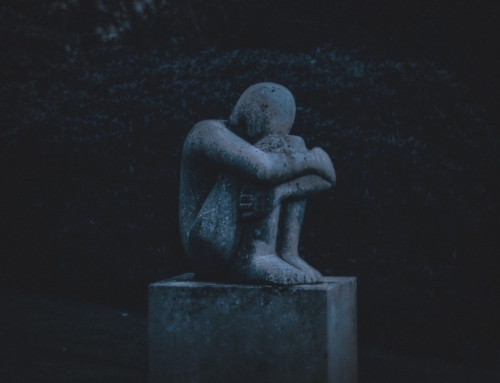Maria is a 26-year-old woman who stares out the window of her pristinely kept suburban home. Although her window is crystal clear by appearance, she feels as if it might as well be covered with prison bars.
Maria married Ricky six years ago. Her life prior to being with him seems like a forgotten dream. The glow of being a new bride and the glitter of her wedding ring faded soon after she said, “I do.”
 Instead, her life has been replaced by the dark specters of a nightmare she can’t wake up from and never in a million years dreamed she would be living. Maria’s Prince Charming became the Beast and her fairy tale castle a dark prison tower as soon as the couple reached the door of their honeymoon suite.
Instead, her life has been replaced by the dark specters of a nightmare she can’t wake up from and never in a million years dreamed she would be living. Maria’s Prince Charming became the Beast and her fairy tale castle a dark prison tower as soon as the couple reached the door of their honeymoon suite.
To the outside world, Maria and Ricky appear to be the perfect Christian couple. Ricky is a deacon in his church, while Maria is a young mom who works in the nursery, the perfect place to both serve and watch the couple’s 18-month-old daughter.
A 29-year-old ambitious businessman, Ricky is the sole breadwinner for the family. On the surface, Ricky is a confident, charming, well put together, articulate young man who can spew Scripture verbatim by memory at the snap of a finger – a model Christian whom others aspire to emulate.
Meanwhile, Maria is the veritable definition of the Proverbs 31 woman – a dutiful, quiet, submissive wife and mother who has mastered the skill of pasting on a plastic smile for all to see.
Beneath the veil, though, lie the hidden tears and pains of a far less blessed union. As a stay-at-home housewife and mother, Maria is expected to care for her husband, cook the meals, do the laundry, maintain a perfectly spotless house, and raise their daughter. Though Ricky has never laid a hand on her, the bruises and scars inflicted upon her soul over the years have been no less wounding.
Eventually Maria consulted with a doctor to help her deal with her chronic stress and anxiety. The doctor prescribed a medication to help her manage her symptoms, but as a result, Maria has developed an opioid addiction. This is just one more thing that Ricky holds over her.
An orderly man with deeply ingrained insecurities, fears, and jealousy, Ricky has made it virtually impossible for Maria to ever leave him. An excellent businessman and the sole person in charge of the couple’s finances, he knows exactly where and how every dollar is spent.
While Maria is given an allowance and is expected to give Ricky receipts of every purchase and a detailed account of every penny, no such restrictions or expectations exist for him. From his latest electronic gadget, to his brand new car, to fun-filled weekends with his friends, he freely spends his well-earned money on whatever he determines necessary.
Ricky knows every single one of the people connected to Maria’s life – their addresses, phone numbers, where they work, email addresses, Twitter accounts – he knows it all.
He has installed tracking software on Maria’s cell phone so he knows where she is at all times, can see every call she has made, every text message and email she has sent, every Facebook and Instagram post – everything. He knows all of her passwords to all of her devices as well as all her email and social media accounts, so nothing escapes his ever watchful eye.

If she’s even 15 minutes late returning home, the interrogation commences. “Where have you been? What have you been doing? Who have you been with?” After all, in his mind, God has assigned him to be the shepherd to this little lamb he’s been given and God will hold him responsible if she wanders off and gets into mischief.
Ricky is always accusing his wife of cheating on him, an accusation that’s not entirely baseless. Just three years ago, Maria reached out to an old boyfriend for support. Text messages exchanged between the two of them led to a brief and stormy weekend affair – a decision she has beat herself up for ever since.
The affair ended abruptly when Ricky found the messages and confronted them. He kept the messages and reminds her of that betrayal often. At the same time, he has hidden the fact that he himself has an addiction to pornography and that he regularly texts inappropriate messages to other women.
Maria is not the only one who has had past indiscretions. Unbeknownst to her, Ricky has had multiple rendezvous with other women while on his business trips. He justifies his behavior with the fact that men have needs and that he needs to keep his options open, should Maria somehow, some way find a way to leave him.
In the end, Ricky doubts Maria would ever have the courage to do that, as he’s got an ace up his sleeve. He’s threatened to tell everyone in her life everything she’s ever done, including the abortion she had in high school if she ever decided to leave him. She’s kept that secret safely hidden away not only from her friends, but also from her very conservative Christian family.
Ricky has kept a meticulously detailed journal for years and told her that if she were to leave him, she would be destitute and that the court would easily award sole custody of their daughter to him. He says that when they look at her, all the courts would ever see is an unfaithful wife, an opioid addict who has never held a job, lays around the house all day, and is at best a mediocre housewife and mother.
The public Ricky that everyone else sees is the life of the party. He’s fun, and everyone seemingly wants to be his friend. The private Ricky that Maria sees is an entirely different man. Ricky has quite a temper and has destroyed his share of things during his frequent rages.
Angry outbursts, near constant criticism, and long, belittling lectures are part of everyday life. He’s quick to point out the smallest perceived flaw, and praise is almost never given. Maria is routinely told that all of the couple’s problems are her fault. In fact, as long as she’s known him, Maria has never heard Ricky give what she would consider a sincere apology or accept responsibility for any wrongdoing on his part.
From his perspective, Ricky is a hardworking man. It’s his job to bring home the paycheck and his wife’s job to take care of him, the house, and the kids. Though she’s begged him for attention and for help countless times, he tells her that she’s an ungrateful, needy woman who’s never happy.
 He proudly declares he’s a model husband who takes good care of her, detailing for her all of the nice presents (most of them appliances) he has bought for her over the years. Housework and taking care of children is “woman’s work,” and if she were a better wife and mother, everything would be fine. In fact, he ought to be given a medal for putting up with such a lazy, no good woman and all her nonsense.
He proudly declares he’s a model husband who takes good care of her, detailing for her all of the nice presents (most of them appliances) he has bought for her over the years. Housework and taking care of children is “woman’s work,” and if she were a better wife and mother, everything would be fine. In fact, he ought to be given a medal for putting up with such a lazy, no good woman and all her nonsense.
While she’s never said so, deep down inside, Maria believes that Ricky’s right. Ricky makes a regular habit of turning on the TV within moments after coming in the door from a hard day’s work. He remains completely engrossed in it until dinner time.
After dinner, he plays xBox or is on his computer for the remainder of the evening, slowly sipping down his usual three or four beers as he unwinds. He spends little to no time interacting with either his wife or his daughter, barely acknowledging their existence.
Meanwhile, Maria is constantly on the move performing her many household duties while keeping a close eye on Gabriella, making sure she doesn’t bother or upset her daddy. After getting Gabriella ready for bed and putting her down for the night, Maria is expected to fulfill her husband’s needs for intimacy before he has to go to sleep and start the whole routine all over again the next day.
On the weekends, Maria and Gabriella usually see Ricky very little, as he spends most Saturdays out with his friends while Sunday afternoons after church are dedicated to watching football.
Maria lives a very scared, lonely, and empty existence. She wonders if she’ll ever be happy and if she honestly deserves any better in life, given all of the past sins she has committed.
What is the Definition of Abuse?
The Maria that I described above is a fictional character. She doesn’t exist. And yet she really does. There are many women out there just like her (to one degree or another).
Before beginning our discussion, a natural question should be raised: What really constitutes abuse? According to the National Domestic Violence Hotline:
“Relationship abuse or domestic abuse is a pattern of behaviors used by one partner to maintain power and control over another partner in an intimate relationship.”
<That’s a very good definition of abuse. For abusers, abuse is basically all about gaining and maintaining power and control over their partner for their own benefit at the expense (and often detriment) of the other person.
Abuse is about harming others for one’s own selfish gain. Abuse wears many faces. It crosses every boundary. It’s found in people of every walk of life – all socio-economic classes, all races, all ethnicities, all cultures, all ages, women and men alike.
Abuse Toward Men
Believe it or not, I have personally worked with many cases where the above scenario was reversed – where the man was the one being abused and neglected by the woman. When it comes to abuse and neglect directed towards men, the national statistics on abuse do not even come close to painting an accurate picture of just how widespread of a problem it actually is.
Many fear the shame of their manhood being questioned, and feel like no one will ever understand them, so they simply decide to “be a man,” suffer in silence, and bury their feelings and traumatic memories deep inside. If that’s you, I encourage you to reach out to a caring Christian counselor today.
Abuse in the Church
Sadly, even in the church there are many who do not love one another as Jesus does. Once again, I believe the statistics do not tell the true story of just how widespread scenarios like Maria’s are in the church.
Too many Christians believe it’s the Lord’s will as a good Christian to endure such treatment. After all, Jesus told us if we were struck on the right cheek to turn to him the other also (Matthew 5:39).
On His way to the cross, Jesus loved those who were abusing and mistreating him. He never fought back or defended Himself toward those who hit, spit, whipped, and drove the nails into His hands and feet. Aren’t we as His children supposed to do the same? Let’s take a brief look at answering that question.
 What Does the Bible Say about Abuse?
What Does the Bible Say about Abuse?
People often ask for my opinion on what Bible-believing Christians are supposed to do when it comes to abuse and mistreatment.
What does the Bible have to say on this matter? My honest answer is that I’m not entirely sure there is a cookie-cutter, one-size-fits-all, rock solid biblical answer that applies to each and every solitary scenario.
When it comes to abusive marriages, the Bible is pretty clear on what marriage is supposed to look like. Genesis 2:24 provides us with the biblical standard for marriage: “For this reason a man will leave his father and mother and be united to his wife, and they will become one flesh.”
When confronted by the Pharisees regarding His views on divorce in Matthew 19:3-12, Jesus quotes Genesis 2:24 and clearly spells out that marriage is supposed to be a lifetime union between one man and one woman. As He says in Matthew 19:6, “Therefore what God has joined together, let man not separate.”
The only exception Jesus allows divorce for is in the case of “marital unfaithfulness” (Matthew 19:9). The word there for “marital unfaithfulness” is the Greek word “porneia,” which means sexual immorality.
Porneia is where we get our modern word pornography, and from a biblical perspective, it would appear to relate to any form of sexuality or expression of sex that is outside of the context of a biblical marriage between one man and one woman.
Why? What’s behind all of that?
Well, when it comes to relationships, the Bible makes it crystal clear that God is all about unity (John 17:11). After all, God’s very heart is about relationship. He’s all about relationship.
In fact, God didn’t only make us for relationship … He Himself is a relationship (Father, Son, and Holy Spirit). It’s His very identity, and since we’re made in His image (Genesis 1:26-17), it’s our identity, too. I’m convinced that’s one of the reasons God created marriage in the first place – so that we would begin to grasp that.
So does that mean, then, that the Bible says that if we’re married, we have to put up with abuse and neglect? Is that what Jesus was telling us to do when He told us to “turn the other cheek” (Matthew 5:38-38-39)? Didn’t He say we were supposed to “love your enemies” (Matthew 5:43-48)?
Well, yes, He did say that . . but Jesus also said, “Love your neighbor as yourself” (Mark 12:31). I’m convinced that far too many of us hear the “love your neighbor” part, and we don’t hear the “as yourself” part. As yourself? Are you saying that Jesus is saying that I’m supposed to love myself? Love myself? That sounds an awful lot like selfishness to me. Doesn’t the Bible condemn self-centeredness and pride?
Now, I know that many of you may knee jerk at this idea at first, but stay with me for a second. There is a huge difference between selfishness and self care.
The idea of self care, unbeknownst to many, is actually very biblical. In his discussion to husbands about how they are to love their wives, the Apostle Paul writes this — “In this same way, husbands ought to love their wives as their own bodies. He who loves his wife loves himself. After all, no one ever hated his own body, but he feeds and cares for it, just as Christ does the church” (Ephesians 5:28-29).
If you doubt that idea, check out the gospels. Did Jesus care for himself? Sure he did. In Luke 5:16 it says, “But Jesus often withdrew to lonely places and prayed.” Why did he do that? It’s because he recognized that his own batteries needed frequent recharging.
He prays for himself again before he goes to the cross in John 17 and at Gethsemane (Luke 22:39-46). After he was raised from the dead, Jesus is seen eating bread and fish with his disciples (John 21:12-15).
Those are just a few passages, but to me, one of the strongest and most profound is 1 Corinthians 3:16:17: “Don’t you know that you yourselves are God’s temple and that God’s Spirit lives in you? If anyone destroys God’s temple, God will destroy him; for God’s temple is sacred and you are that temple.”
 Paul reiterates that same exact message in 1 Corinthians 6:19-20. Hear that and really let that sink in. You, yes you, are God’s temple. If anyone destroys God’s temple, God will destroy him. Wow! Do you begin to see how God truly feels about you? Do you honestly believe he’s happy when you’re being abused? Hardly. In fact, it’s the exact opposite.
Paul reiterates that same exact message in 1 Corinthians 6:19-20. Hear that and really let that sink in. You, yes you, are God’s temple. If anyone destroys God’s temple, God will destroy him. Wow! Do you begin to see how God truly feels about you? Do you honestly believe he’s happy when you’re being abused? Hardly. In fact, it’s the exact opposite.
God loves people – all people. He has a heart for and is close to the hurting and the broken (Psalm 34:18). God is not okay when people, especially the innocent, meek, and lowly are taken advantage of and hurt for selfish gain (see Exodus 22:21-24 and Isaiah 10:1-4). Sins like abusive behavior are exactly why the wrath of God is coming (Colossians 3:5-10; 2 Timothy 3:1-9).
Things to Consider about Abusive Situations
Keep those things in mind as we continue our discussion. As a counselor who works with abusive situations and those whose lives have been touched by abuse, here are some other things that I cover with my clients that you should also consider.
Do you honestly believe you deserve to be mistreated?
The very fact that you’re asking the question, “What should I do?” tells me quite a lot right off the bat. As a counselor who is a deeply committed Christian, I am passionately in love with God and because of that, I am also passionately in love with people as well (John 13:34-35).
As believers in Christ, we are encouraged to speak the truth to one another in love (Ephesians 4:15). That is exactly what I intend to do right now. Let me ask, how did you fall into this pit?
Why are you looking to someone else to tell you what you know deep down in your heart you need to do? Many people unwittingly seek others to tell them what to do.
Let me tell you a brief story. Years ago, my wife and I tried to help someone we knew who was in a very difficult situation. We took the initiative of moving her out of her place into ours and offering to help her.
We told her that we would do whatever we could to help her get on her feet and be successful. But, if she decided to go back, we couldn’t help anymore.
What happened?
Within the space of hours, she went back to him. Deep down inside, I believe she was scared and that she honestly didn’t believe she deserved any better.
A few months later, she decided all on her own to leave – she disappeared and didn’t reappear for a long time. She finally decided that she’d had enough. She finally decided all on her own that she deserved better treatment.
People in abusive situations quite often have others telling them that it’s time to get out. What I’ve learned from experience is that kind of help doesn’t work.
The person who’s being abused deep down believes they’re powerless. They feel like they have no power and control over their lives. So, when a caregiver helps like that, when they intervene when a person isn’t ready, in reality all they’re doing is taking the power away from the one who’s being abused (ironically just like the abuser).
The caregiver is taking power and control in that situation rather than allowing the one who’s being abused to see that they actually have power and control. See the difference? Until the person being abused decides they’re not going to put up with abusive treatment anymore, nothing will ever change.
Love them enough to say “No.”
Here’s a perspective that you often don’t hear. Did you know that when you allow yourself to be abused, mistreated, and neglected, you’re not only allowing yourself to be harmed . . . you’re actually allowing the abuser to be harmed as well. Ouch! Are you serious?!? How am I hurting them by allowing myself to be mistreated?
Well, think about it. When we allow them to continue being abusive and give into it, all we’re doing is reinforcing those negative patterns. We’re allowing them to remain sick and to become sicker and sicker. It’s not unlike kids throwing a temper tantrum and being rewarded for it.
Think about it. How do you think abusive adults became abusive in the first place? Right. They learned those patterns as children and they became reinforced over time. Saying “no” is sometimes the most loving thing we can do for someone. If that’s you, let me encourage you to have the courage to set limits and say no more, not only for your own good, but also for theirs.
Is there any hope that he or she can ever change?
Is that even possible? Have there been cases where an abusive person truly changes?
There are many examples out there, actually. If you’ve seen the movie, I Can Only Imagine, Bart Millard’s father is one. Nothing is impossible with God (Matthew 19:26).
Will they change? That’s a whole different question. The Ricky whom I described in the above scenario is a classic narcissist – in other words, we clinicians would diagnose him as having Narcissistic Personality Disorder according to the DSM-V.
A better question to ask when looking at a person like Ricky is, “Why would they change?” From Ricky’s perspective, everything’s fine with the marriage. It’s Maria who has the problem, not him. Everything’s great. He’s not in pain or distress at all. So, why would he change?
From his point of view, he’s got no reason to change. Ricky is very much the Pharisee whom Jesus rails against in Matthew 23, seeing clearly the speck in his brother’s eye and completely blind to the beam in his own (Matthew 7:3-5).
From a clinician’s standpoint, NPD is on a scale (I like to think of a 0-100 scale). The further up the scale a person is, the more difficult it will be for a person to see their own beam. What then can ever wake someone like this up or help them to see their own faults? One word – pain.
Years ago, I believed (like many Americans) that pain was something that was bad. Pain was something to be avoided at all costs, to be medicated away, to be soothed, and to be gotten rid of.
The older I’ve gotten and more steeped I’ve become in my faith, the more I’ve come to realize that often times, pain is one of God’s greatest gifts to us.
Think about it. Whether we’re talking about physical pain, emotional pain, relationship pain, or whatever kind of pain you want to consider, pain is a signal that something is wrong.
If I get stabbed in the leg with a knife, the nerve endings in my body will scream to my brain that there is something stuck in there that shouldn’t be there. Exactly. It is no different with relationship pain.
The very fact that you’re experiencing pain in your relationship is a signal that things aren’t as they’re supposed to be between the two of you. C.S. Lewis once said, “Pain was God’s megaphone to a deaf world,” and I often add – “and some people can be quite deaf.”
The first step toward change for a hard-hearted person like a Ricky is that they’ve got to experience pain – often times, significant amounts of pain.
I’ve talked to a lot of clinicians over the years (counselors, psychologists, psychiatrists, Christians as well as non-Christians) and they universally agree that what I’m about to tell you is true. As long as the abuser is not feeling any pain, as long as they don’t feel any internal experience of emotional turmoil, I can promise you that nothing’s going to change.
As counselors, it’s not uncommon to receive phone calls from individuals who say, “Hi. My wife left me today and said she’s filing for divorce. I need help.” In such situations, it’s not uncommon to eventually find out that the wife has begged and pleaded with the husband for years to go to marriage counseling, go to marriage seminars, etc. – she’s literally done everything she can possibly do short of taking this drastic step. Only when the pain became real (instead of just a threat) did he finally wake up.
In the end, a separation from you may be the only thing that’s going to wake the abusive spouse up to the fact that there’s a problem. You may have to take the drastic step of moving into a spare bedroom, going to stay with mom or a friend, or yes, even filing for a legal separation.
Now, hear what I’m saying to you right now. Only you know your situation. It may not be safe for you to do that. If you honestly are fearing for your safety, if you have legitimate reason to believe you or your children could be in danger, you need to honestly, carefully consider your actions.
If that’s you, let me encourage you to seek out professional help from those who work with domestic violence situations on a regular basis. When it comes to your circumstances, there is one thing I can virtually promise you – if nothing changes, then neither will your situation.
What if they decide to leave me?
Well, there are cases where that does in fact happen. If, for example, a person like a Ricky isn’t getting what they feel they need from you, it’s entirely possible that they could decide to move on. I’ve seen situations where the abuser eventually did decide to seek a divorce and find someone else.
In those situations, what’s the biblical response? Well, in these situations, I often point to 1 Corinthians 7:12-16 and let that be your guide. That passage specifically deals with situations where a believing spouse is married to an unbeliever.
1 Corinthians 7:15 says, But if the unbeliever leaves, let him do so. A believing man or woman is not bound in such circumstances.That has been an enormous comfort for many people I’ve worked with.
But, Paul is quite clear that if there is a situation where a believer is married to an unbeliever and the unbeliever is willing to stay married, then the believer should stay with them.
As he says in verse 16, “How do you know, wife, whether you will save your husband? Or how do you know, husband, whether you will save your wife?” That fits with what Jesus says in Matthew 19:3-12 and Mark 10:1-12. Why? Ultimately, it’s because while God cares very much about our lives, our pain, and our suffering in the here and now … He’s much more interested in the eternal.
He wants you and everyone to be home with Him – our eternal home where there is no more death, no more mourning, no more crying, no more pain, no more tears, no more sorrow (Revelation 7:13-17; 21:3-4). He wants everyone to be saved and come to a saving knowledge of the truth (1 Timothy 2:3-4; 2 Peter 3:9). Are there exceptions to that? Let’s talk about what I believe is the biggest one of all.
What about the kids?
This is oftentimes one of the strongest arguments for why someone who is being abused ultimately decides to leave their abusive spouse. When you have kids in the mix, that really alters the equation.
The bottom line is that in families, kids learn behaviors that they will ultimately carry forth into their future relationships. Counselors, psychologists, psychiatrists, and all of those in the helping field are mandated reporters when it comes to situations where abuse and neglect are happening.
The job of Child Protective Services is to watch out for those young lives who are being impacted by abuse and neglect. Physical and sexual abuse are unbelievably impactful. If that’s happening, that needs to be reported to the authorities.
In the case of sexual abuse, I’ve know some in the past who have chosen to stay with the abusive spouse, believing that they might be able to change. As someone who has worked with pedophiles before, if sexual abuse is happening in your home, please do leave, report it immediately, and seek professional help for you and your children.
Over the years, I’ve talked to many, many fellow clinicians (counselors, psychologists, psychiatrists, etc.) and I’ve asked them this question, “In your professional opinion and experience, can these people truly ever be rehabilitated?”
Let’s just say that the response I’ve gotten has pretty much been unanimously skeptical. Children need and thrive in environments where they feel a sense of love, safety, and security. If that’s not the case, if home is volatile, unpredictable, if there is constant fighting, and the kids generally feel a constant sense of terror and impending doom, then let me strongly encourage you to take them and be elsewhere.
Regardless of the decision you make, there will be consequences
In our society, we very much want to live our lives without consequences. We want to live happy, perfect, pain-free lives. That’s human nature. And let me be quite clear in saying that’s a complete fantasy.
Let me wrap this up by telling you that regardless of what choice you ultimately make when it comes to your marriage, there will be consequences. Relationships and our choices related to them have consequences. They impact us whether we want them to or not.
Divorce – if that’s what you ultimately choose to do – has consequences. There will be consequences for you, for your ex-spouse, for your kids, for your family, for your friends, for your next spouse (should you choose to get married again) . . . and pretty much anyone connected to your life.
If you ever doubt that, just go talk to people who’ve been through a divorce or grown up in divorced homes. First, there are the financial consequences. Washington State, where I practice, is a 50-50 state. That means that in cases of divorce, courts generally divide the couple’s finances and assets right down the middle (50% to each).
In my experience, I haven’t always seen things work out that neat and tidy. One partner or another seems to often get the short end of the stick.
Secondly, unless the court decides there is sufficient cause to terminate or somehow limit parental rights, there is the painful reality of joint custody of the children. Kids will be bouncing back and forth between each of the former partner’s homes. That can be very hard on kids.
Now, I’ve seen situations where this ends up working out as well as it can and both parties are generally amicable and work with one another. More often than not, I’ve seen a whole lot more tension, unease, discord, and no shortage of uncomfortable and difficult conversations over phone calls, emails, text messages, not to mention face to face confrontation.
Lastly, and a factor that few consider, is that even if you choose to leave someone, in reality, most take that person with them. I see it all the time. Many people unwittingly carry around a lot of emotional baggage with them.
Whenever they get into another relationship and they experience something that feels like the former abusive spouse, there is a tendency to project those old feelings onto the new partner. That’s true not only for you, but also for your ex-spouse as well. Relationship dynamics such as these, that we are often unaware of, is why professional counseling is frequently necessary.
All of that said, that doesn’t mean that the choice to leave or divorce someone is necessarily the wrong decision. Will God forgive me if I end up making a mistake or have made a mistake when it comes to my marriage? Of course. God is always faithful and just to forgive us our sins (1 John 1:8-10).
God is in the business of forgiving sins and making broken things brand new. Make no mistake about that, though. Being forgiven for something doesn’t mean that you will necessarily escape the consequences of your actions. Regardless of the choice you ultimately make – to stay or to go – there will be consequences.
Christian Counseling for an Abusive Marriage
I’ve laid out for you God’s overall design for marriage as well as a lot of things for you to consider. Let me end by saying that I know it’s hard to seek help. In my years of working with those who are in an abusive marriage, one lesson has been hammered home time and again for me: silence kills.
As long as you keep your abuse a secret . . . as long as no one knows what’s going on . . . as long as you’re isolated and all alone . . . it will continue.
Sin has its power in darkness. How do we defeat the darkness? By coming into the light (John 3:19-21). Darkness vanishes in the presence of the light. I humbly suggest that if this is you, if this is the situation you’re facing, step into the light and seek out help.
No matter what you ultimately choose to do, you’re going to need a lot of support, encouragement, and healing power that can really only be found by being connected to the greater body of Christ.
Healing is not found in isolation. It is only found in community. If this is you, might I also suggest that you seek out professional help as well. An experienced, caring Christian counselor can assist you in sorting through things with you and providing you the help that you need.
In the end, though, the choice of what to do regarding your marriage is up to you. I hope that this article has been helpful for you and that you’ve been given some things to prayerfully consider.
Photos:
“Battered”, Courtesy of Naomi August, Unsplash.com, CC0 License; “Alone,” courtesy of Francesca Dioni, Flickr Creative Commons, CC0 License; “Breakup”, Courtesy of Tumisu, Pixabay.com, CC0 License; “Broken Heart”, Courtesy of Quicksandala, Pixabay.com, CC0 License; “Bride”, Courtesy of Ishan@seefromthesky, Unsplash.com, CC0 License











